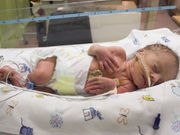No statistically significant difference in neurodevelopment at 2 with hydrocortisone, placebo
WEDNESDAY, April 5, 2017 (HealthDay News) — For extremely preterm infants, early hydrocortisone therapy is not associated with neurodevelopmental impairment at age 2 years, according to a study published in the April 4 issue of the Journal of the American Medical Association.
Oliver Baud, M.D., Ph.D., from the Robert Debré Children’s Hospital in Paris, and colleagues randomized 523 neonates from neonatal intensive care units to receive hydrocortisone (256 neonates) or placebo (267 neonates); 406 survived to age 2 years.
At a median corrected age of 22 months, 379 patients were assessed (194 in the hydrocortisone group and 185 in the placebo group). The researchers observed no statistically significant differences between the groups in the distribution of patients without neurodevelopmental impairment (73 percent in the hydrocortisone group versus 70 percent in the placebo group), with mild neurodevelopmental impairment (20 versus 18 percent), or with moderate-to-severe neurodevelopmental impairment (7 versus 11 percent) (P = 0.33). There was no statistically significant difference between the groups in the mean global developmental quotient score (91.7 versus 91.4 in the hydrocortisone versus placebo group; between-group difference, 0.3; 95 percent confidence interval, −2.7 to 3.4; P = 0.83). There was no significant between-group difference in the incidence of cerebral palsy or other major neurological impairments.
“Further randomized studies are needed to provide definitive assessment of the neurodevelopmental safety of hydrocortisone in extremely preterm infants,” the authors write.
Copyright © 2017 HealthDay. All rights reserved.








